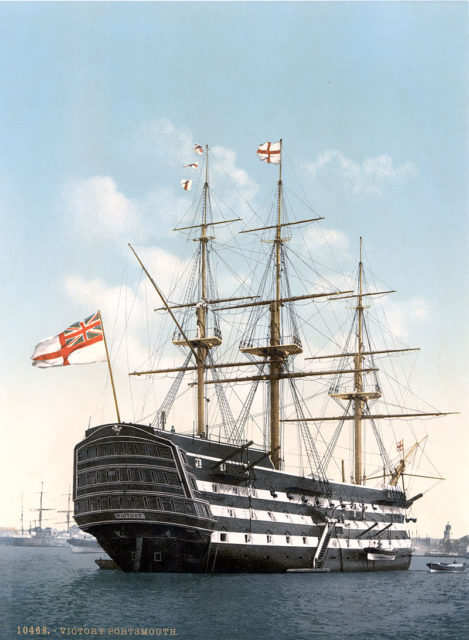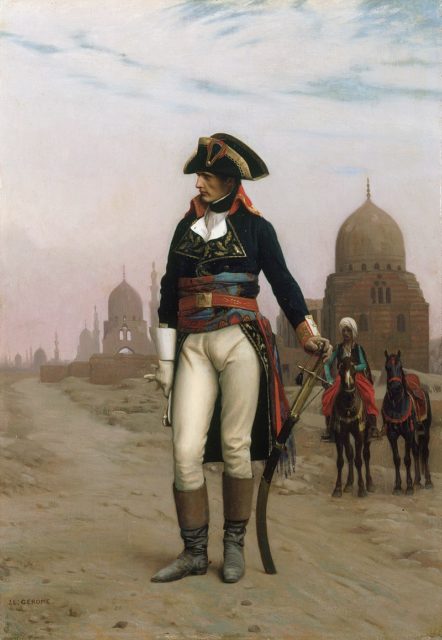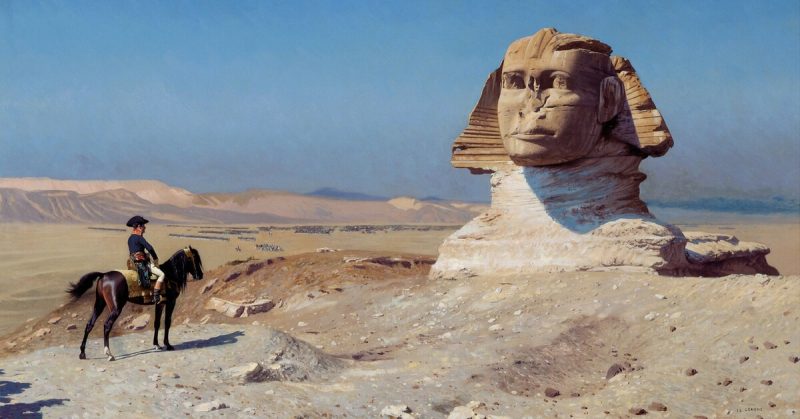Napoleon’s invasion of Egypt was his last great military campaign before seizing power as First Consul of France. Despite being a disaster, it helped him build his reputation.
In some ways, it was an odd choice for a campaign. Up until then, Napoleon had fought in Europe against the neighbors who threatened France. Why go to Egypt?
Invading Britain was too Big
As with America in Vietnam, the ultimate target of the Egyptian campaign was not the country being fought over. The aim was to limit the influence of another great power.
By the late 1790s, Britain was France’s staunchest opponent. A trade and colonial powerhouse, Britain limited France on the high seas and supported her opponents on land.
For a brief moment in 1796-7, an invasion of the island nation looked plausible. Radicals were causing trouble in London. Naval mutinies broke out at Nore and Spithead. Ireland, often the thorn in Britain’s side, was filled with murmurs of revolt.
However, the French could not pull an invasion force together. By the time Napoleon was overseeing this potential project in 1798, the moment had passed. The huge military and logistical resources needed to invade the British Isles could not be mustered.
A less direct approach was needed.
Economic Warfare

Britain’s strength lay in its economy. If that could be undermined, then it would be far less able to field armies and navies. Much of that wealth came from India, flowing through Egypt and the Mediterranean. If France could control Egypt, then it could not only undermine the British economy but boost her own.
Other options were also considered. Attacking British colonies could cut off some of the nation’s financial and material supplies. Invading Hanover and Hamburg could damage British economic interests in Europe.
The State of the Navy
One of the reasons for not invading Britain was also an argument against invading her colonies. It was the state of the French Navy.
While an invasion of Britain was being considered, Napoleon took a tour of French ports, surveying the shipping and supplies available for war at sea. What he saw convinced him the French Army could not be safely escorted across the Channel. The French Navy was in a sorry state, while the British Navy was the envy of the world.
Invading the British colonies was one of the options Napoleon offered to the Directorate government. It must have seemed a dubious prospect at best. Colonial wars relied upon fleets for transport and supplies. It was too risky a prospect.

A Long-Standing French Goal
French eyes were already looking towards Egypt. French governments had dreamed of invading the country since the days of King Louis XIV. The Duc de Choiseul had put forward such a scheme following the loss of France’s former colonies in India and Canada. It was an option already in the minds of French politicians; a part of their dreams of global influence.
For post-revolutionary France, there was an extra advantage. As a colony, Egypt would not be reliant upon plantations and slave labor like so many colonies were. It would be more in line with the egalitarian dreams that France had not yet abandoned.
Dreams of the Orient
A wider European vision of Egypt played its part in this dream.
In the middle of the eighteenth century, Egypt had been a stable and culturally rich country. Its strong trade links spread images of Egyptian culture which intoxicated the European upper and middle classes.
This was a classic example of what has since been labeled Orientalism. Europeans saw Egypt as exotic and yet somehow simple, a place they could and should dominate, a land which it would be fascinating for them to experience.
The political crises that destabilized Egypt from the 1760s on did not disrupt this image. Napoleon knew little of the reality he would face.
Talleyrand’s Manoeuvring
Charles Maurice de Talleyrand, the Directory’s Foreign Minister, played a part in making the Egyptian expedition happen.
A skillful political schemer who would survive the Napoleonic era, Talleyrand was always on the lookout for ways to increase his influence. Napoleon sold him on the advantages of an invasion of Egypt, with the wealth and diplomatic power it would bring. It was a vision to delight a foreign minister.
The Directors were suspicious of Napoleon, this young, publicity-hungry general. So Talleyrand claimed responsibility for the idea of invading Egypt. It was an opportunity for him to boost his image in the name of political pragmatism. It also allowed the Directors to accept Napoleon’s scheme without acknowledging it as his idea.
To achieve his aims, Talleyrand made the invasion possible.
Napoleon’s Political Ambition
Behind all this – the abandonment of the British campaign; the quest for a substitute; Talleyrand’s proposal of Egypt – lay Napoleon’s ambition.
Since he was a child, Napoleon had read about history’s great political and military leaders. Julius Caesar. Alexander the Great. Pompey. These were the idols he aspired to.
At every step in his career, Napoleon sought ways to make himself look more impressive. He sponsored painters, commissioned newspapers, and took care to spread the word of his achievements.
What could be greater than conquering the exotic jewel of Egypt?
Enlightenment Curiosity
Napoleon’s motives were not entirely cynical. His interest in the past came from a sense of intellectual curiosity that dominated Enlightenment Europe. He wanted to know more about history and the world.
This was the reason he took 160 scholars with him to Egypt. Their work would bring him glory, but the army could do that. What these scholars alone could provide was a wealth of knowledge to be taken back to France and spread from there around the word.
Napoleon wanted to know more about Egypt. He also wanted to learn about it while making himself and France powerful.
Sources:
Alan Forrest (2011), Napoleon.
Matthew D. Zarzeczny (2013), Meteors that Enlighten the Earth: Napoleon and the Cult of Great Men.
